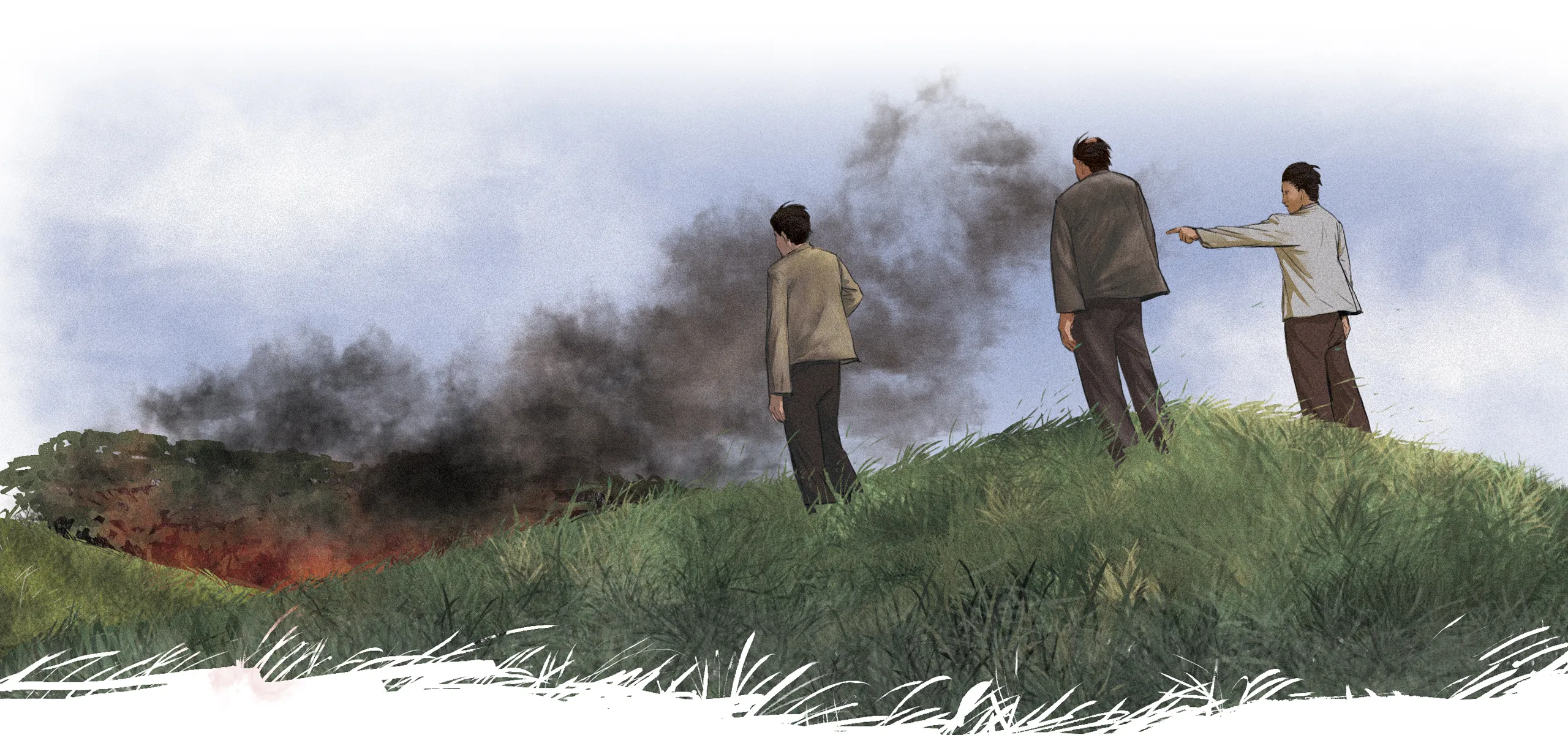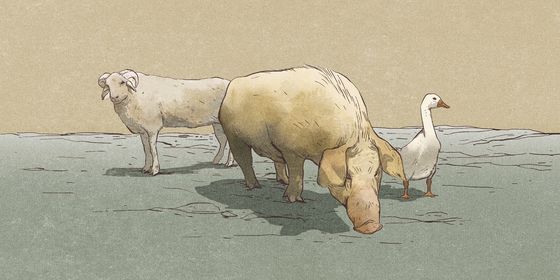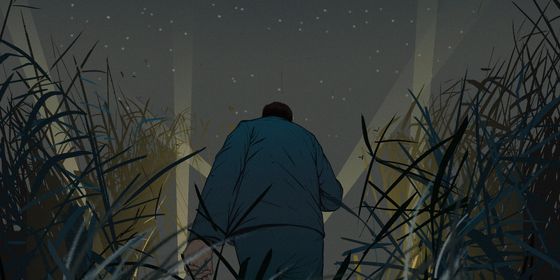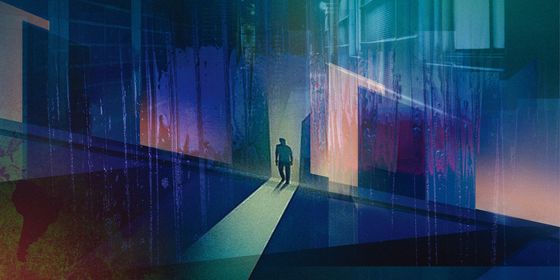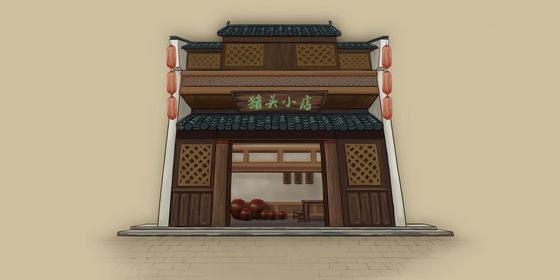Author A Yi’s tale of bureaucracy and absurdity behind county officials’ futile attempt to put out a fire
Content warning: The following story contains graphic content.
The highway doesn’t end when it passes through other counties. It keeps going, to Wuhan, to Shaanxi, Gansu, Ningxia, to Rome even. But when it reaches us, it must come to a halt. Our county isn’t a destination for the nation’s floating population, unless you count the proprietors of the Wenzhou Hair Salon. Once the entire country stops hula-hooping, our county picks up the fad. Our county is the world’s appendix.
But from Qinglongshan police station, I worked my way up to the county public security bureau and the county government office. That somehow took five years. Over that period, my former chief was only sent to Baihu county at the same rank. One day, the chief and I were sitting at a mahjong table with the head of residents’ affairs and his retired predecessor. We were four generations, seated at each edge of the table. The head of residents’ affairs wasn’t having much luck, so we rolled dice to decide how to reshuffle our positions. We ended up each shifting clockwise, each moving one seat to our left. I felt the residual body heat left in the chair by the rear end of the police chief. When I glanced over at the gray-haired, ceaselessly coughing retiree on my right, I couldn’t help but feel a bit gloomy. This is how life is buried.
The other day, I slipped lazily out of the municipal offices around noon and looked up at the sky. It was so blue that it made me a bit uneasy. But I noticed some gray floating in the air, too. It floated around for a while, then fell. I saw the county Party secretary and his deputy, accompanied by the county head and his deputy. Their hands stuffed in their pockets, huddled together, sighing. I had hoped to sneak around them, but one of them called out to me: “Go buy us some nutritional supplements.”
I asked: “What standard should I follow?”
He said: “Severely injured.”
That meant hitting the five-hundred-yuan mark. I rushed out of the gate and toward the shop across the way, where I knew I could put down a signature in exchange for yak bone powder and some other stuff. “I bet you haven’t got wind of this, but the three big guys of Baihu county all got severely burned in a fire,” the shopkeeper said.
I asked: “Which three?”
“The township head, the chief for military affairs, and the police chief.”
My heart sank when I heard the news. I was almost hit by a car as I crossed the street.
As I headed toward Renmin Hospital, I heard some county officials talking. “The fire wasn’t even worth fighting,” one said. “Imagine, getting burnt up like that!” said another. I tried to imagine what “like that” might be. Did their clothes burn off of them? Did their flesh melt away? Were they just a pile of greasy bones on a gurney? I felt my pace slowing. When I entered the hospital, the stench of Formalin nearly killed me. The way the doctors and nurses were shouting, I thought the station chief was about to die.
After half an hour of uncertainty, a doctor opened the door to the emergency room and let us in. The county officials lined up in a row and stood on tiptoes to try to peer through the glass at the top of the door. They muttered curses under their breath. I followed their gaze. Two lights shone through like flashlight beams. I steadied my breathing and took a detailed look. I saw someone burned as black as charcoal. It was as if the smoke still clung to him. I figured it must be the station chief. Tears streamed down my cheeks.
The station chief’s wife came, dragging a bedroll under her arm and a ball of distress in her heart. I mentioned the nutritional supplements. “This is a little something from the county. We want to help you get through this.”
At first, the station chief’s wife couldn’t stop crying, but when she saw that I was even more distraught than her, she stopped weeping and came to comfort me. After a few back-and-forths, she finally rushed back to the ward. But she went into a different room than I had been led into. I wondered if I had mistaken someone else for the chief. The fire, after all, had scorched its victims beyond recognition. That could be good news: perhaps the station chief was not injured quite so severely; otherwise, why would his wife comfort me instead?
I decided to peek inside. It wasn’t a good idea. The station chief was like a Russian black bear, or an Egyptian mummy, lying silent on spotlessly white sheets. His condition was even worse than that of the man I had seen upon arriving.
I went to the hospital again after work a few days later. A pale blue light shone down on the station chief. They said they were sterilizing using ultraviolet lights. I thought the disinfection was necessary. There were lumps of black and red flesh on his face, some already expelling pus. They looked like dozens of revolting worms. Before long, pus started oozing out. The station chief grimaced a few times, and the doctor hurriedly grabbed tweezers to wipe it away with gauze.
I didn’t want to look too closely at his face, so I glanced at his arm. It was burned black. I looked at his hand. It was burnt bright red and the flesh had turned soft and curled up. I bit the inside of my cheek until I couldn’t take it any longer. I decided I needed to do something. I calmed and steadied myself. “Chief,” I said, “it’s not as terrible as everyone is saying. It doesn’t look that bad at all.”
The station chief began to weep. “Really?” he asked. He called to his wife: “Hongxia, bring me a mirror.”
“The doctor told me that you can’t be exposed to any light,” she said in a relaxed tone. “The mirror’s reflection would be too bright.”
The station chief moaned again. “I didn’t believe it when they told me that I looked fine,” he said. “But I’ll take your word. You are an honest man. You wouldn’t try to deceive me now.”
“Right, right...” I said.
The station chief’s wife saw me out. I told her that I couldn’t bear to see him cry. It made my heart hurt. She comforted me: “He was laughing, not crying.”
I went back after a few more days. The station chief was checking himself carefully with a mirror. His body had formed a thick layer of scabbing that made it look like he was wearing a suit of armor. I noticed a copy of Stories magazine beside his bed. I picked up the magazine and started reading, thoroughly enjoying it. The station chief asked me if I had noticed the advertisement on the back cover. It was for a product called Mili Scar Ointment. He wondered if it really worked.
I flipped to the advert. It read:
“From an ancient recipe handed down through generations; tested by clinical practice; verified by traditional Chinese medical theories; proven by modern pharmaceutical technology. Technologically advanced, highly effective, easy to use, proprietary blend.”
The advertisement included a before-and-after image: on the left side was fetid meat, and on the right side, was the result of applying the product—healthy flesh. “It probably works,” I said. “If it didn’t, someone would have destroyed the editorial office.”
I opened an issue of Zhiyin magazine on the headboard and happened to flip again to an advertisement for a scar ointment. There was a before-and-after picture attached to it, too. After applying the ointment, the scars disappeared without a trace, leaving the flesh rejuvenated. I knew the station chief must have seen burn victims before. Their faces looked like scorched pizza. How could he believe the claims in the advertisements? But, I decided, the alternative might be to give up hope completely.
As I pondered this, the station chief suddenly wailed: “I’m so itchy. It’s driving me mad.” He writhed like a centipede, rolling back and forth in a terrifying way, shuddering. We couldn’t decide whether or not to hold him down by force, so all we did was listen to him howling away like a diesel engine on the bed. Sometimes he called for a shovel, sometimes for a rake, anything to scrape away the feeling of tens of thousands of ants crawling all over him. Tens of thousands of ants!
I was so shocked and fearful that I had developed an itch, too. I pressed down the urge to scratch it, for fear that the station chief would think I was showing off. All I could do was endure the pain. It was like enduring purgatory. The station chief ranted for a few minutes, then quieted down, enduring the pain.
“Is it any better?” I asked pathetically.
Tears and snot began to run down the face of the station chief. He made no comment.
After a few days, I went to the hospital with Lao Yuan, the deputy head of the local public security bureau. Lao Yuan was the one who taught me how to write government documents. We were to work together on an essay praising the station chief as a model public servant. We planned to pass it up the chain of command. At the same time, the station chief suddenly seemed rejuvenated: except for his grizzled hands, the rest of his body was bright red, like a steamed shrimp or a flushed young girl. The burns turned out to be not fatal at all and actually resulted in him growing new skin. He was in good spirits. He smiled and offered us canned food from his cache. We turned him down.
The station chief bit into a chunk of pear, squinted, and began telling us about the fire.
It had been in the evening. The station chief was daydreaming when the township head rushed into the room, calling for help fighting a fire. Seeing no way to get out of the task, the station chief got into the township head’s car and picked up the section chief of military affairs along the way. They arrived at a hillside, where a crowd was fighting a fire, whose bright yellow flames licked up toward the sky. They beat the fire with their clothes and splashed water on it.
They drove a bit further, parking the car in a safe place on the other side of the hill. The three men—the station chief, the township head, and the section chief—got out of the car and rushed for the fire. Looking down from the ridge at the scarlet smoke, gesturing at the flames, they looked like a trio of founding fathers. It was an impressive scene. Unfortunately, God had other plans: the east wind suddenly gave into the west, and the fiery lion tossed his mane and began trampling on the dry saw grass that ran toward them. The three men froze for a while before realizing the only solution was to flee. A terrible roar came from the fire as if the beast had scented human flesh.
The station chief said: “At the time, I don’t think I could even feel the ground or the dry grass beneath my feet. I felt like the whole universe was reduced only to the sound of my lungs huffing and puffing, and my heart thudding. I could only feel the flames clawing at my backside.” Time is what it takes to save a life, after all. Suddenly, the township head in front of him fell. They couldn’t do anything to save him. The two men glanced at one another, then took off, racing like Carl Lewis and Ben Johnson in the hundred meters at the 1988 Olympics. “That was when I realized thighs are a great hindrance to speed,” the station chief said.
The station chief ran until it seemed he had entered a void, unsure whether he was leaping forward or flying. Suddenly, he felt heat across his body, as if he had been dashed with boiling water. He screamed in pain but gritted his teeth and kept running. He ran for a long time. Finally, he realized that the flames were already far ahead of him. He blacked out and collapsed to the ground.
“The fire was already ahead of me, and I was still chasing it like a fool,” the station chief said. “It seems the township head made the most scientific decision. He threw himself to the ground, and the flames went right over his head. That’s why his injuries were minor. He kept a clear head. The section chief and I were nothing but kindling for that fire.”
I asked him: “Does saw grass have much economic value?”
Lao Yuan said: “It can be used to produce paper. We don’t have a paper mill in this county, unfortunately. If we were to export it, it wouldn’t even cover the transportation expenses. I’ve heard it can be woven into sandals, too, but who knows how to do that these days?”
“Completely useless, then,” I said.
“Right,” Lao Yuan said. “Completely useless. When we write the report, we need to change the saw grass into something more valuable. We can say it was a stand of virgin forest. We could even say that the fire threatened nearby factories.”
“Are you referring to the chemical plant that secures people’s livelihood?” the station chief said. “You two are full of shit. It was just a field with a bunch of saw grass. Nothing was lost when it burned.”
“Then why were you rushing to save it?” Lao Yuan asked.
“It was the township head that got us up there,” the station chief said. “He said that since it was already dark outside, the American satellites could catch sight of the flame if we didn’t put it out. We’d be in big trouble.”
A few days later, I wrote up the report and brought it to Lao Yuan for editing. He spent two days on it. He read it back to me in a steady cadence. When it got to the key moment, he asked, “It’s moving, isn’t it?”
“Very moving,” I replied.
“For what he sacrificed,” Lao Yuan said, “he deserves a third-class merit.”
When I passed the report up the chain of command, there was no response for a long time. After making a few inquiries, I learned that the county leadership was holding it up. They were worried it might cause problems for their winter fire prevention campaign.
Author’s Note
In my early twenties, I worked as a police officer in the most remote area of an inland province in central China. There, everyday events could all have been turned into thrilling fiction, but unfortunately, I didn’t realize there was such wealth before me at the time. In 2006, four years after leaving the police force, I picked two stories from my memory to write about, and here they are.
Countryside Police Station: International Repercussions | Short Story is a story from our issue, “Viral Attractions.” To read the entire issue, become a subscriber and receive the full magazine.





